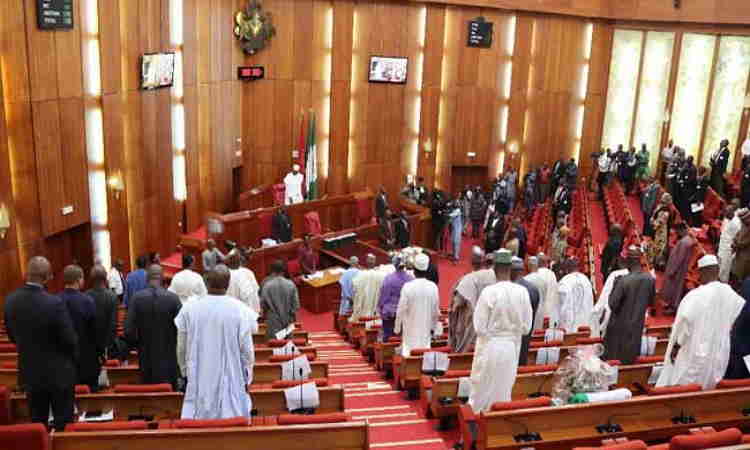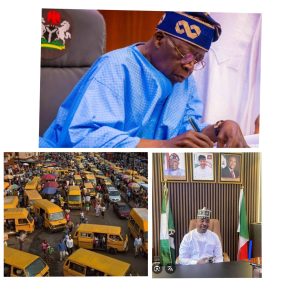
The Nigerian Senate has screened 14 more ministerial nominees appointed by President Muhammadu Buhari for his second term cabinet.
A total of 24 ministerial nominees appointed by President Buhari have now been screened by the Senate.
Of the 43 names submitted by the president on Tuesday, July 23, 2019, the Senate screened 10 nominees during the commencement of the exercise on Wednesday, July 24.
On resumption of the exercise on Thursday, July 25, Tayo Alasoadura, Mustapha Shehuri, Abubakar Aliyu, Bashir Magashi, Timipre Silva, Ramatu Tijani, and Adeniyi Adebayo were screened.
Others are Zubairu Dada, Chris Ngige, Abdullahi Hassan, Sunday Dare, Muhammad Bello, Sadiya Farouq, and Zainab Ahmed.
As was practised on Wednesday, nominees who have previously served in the upper and lower legislative chambers of the National Assembly as well as in a State House of Assembly were not questioned by senators, as is tradition, and were simply asked to ‘take a bow’ and leave after they were introduced.
Nominees who were former legislators and fit this bill on Thursday were Alasoadura, Shehuri, Silva, and Ngige.
Former Anambra State governor, Chris Ngige, has been appointed as a minister after serving as Minister of Labour and Employment in President Muhammadu Buhari’s first term [The Whistler NG] Former Anambra State governor, Chris Ngige, has been appointed as a minister after serving as Minister of Labour and Employment in President Muhammadu Buhari’s first term [The Whistler NG]
Even though they didn’t fit the bill of the privilege as they haven’t served as lawmakers in the past, Aliyu, Magashi, Tijani, Adebayo, Dada, Bello, Farouq, and Ahmed were also allowed to ‘take a bow’ with little or no scrutiny.
Despite appeals from some senators for Hassan to also enjoy the same privilege for his previous exploits in state governance, the former Attorney General and Secretary to the State Government in Nasarawa State answered a few questions on women empowerment and security.
He said, “I think the major framework for women empowerment has been elucidated in the Belgium Conference resolutions. What we will probably do is to domesticate such resolutions and see how we can empower women.
“We can look at our own communities and see how programmes like women empowerment, soft loans, widows empowerment schemes and probably to a large extent some level of scholarship for vulnerable women.”
While answering a question on insecurity, Hassan said it’s important for communities to be the drivers of fighting security challenges.
“What we do is we engage the youth leaders, women leaders, security agencies in outpost stations in the communities, village heads, and district heads to ensure that they participate in security processes,” he said.
Dare, an executive commissioner (stakeholder management) at the Nigerian Communications Commission (NCC), was the only nominee who was thoroughly quizzed by the senators on Thursday, as he answered questions on challenges in the communications sector.
He said the NCC can speed up national development by building on its past success to improve the quality of service.
“We’ve seen that the more we have the penetration of broadband, the more we empower our startups and the more we can empower our youths to be self-employed,” he said.
While making his opening presentation, Alasoadura pleaded with his former colleagues in the upper legislative chamber to ensure the passage of the Petroleum Industry Bill.
Tijani, who was not scrutinised because she’s a woman, promised to addressed the nation’s housing deficit problem and maternal mortality. She said that slums should be upgraded and urban areas should be renewed.
Former Ekiti State governor, Adeniyi Adebayo (left) is another one of President Muhammadu Buhari’s ministerial nominees cleared by the Senate on Thursday [PM Parrot] Former Ekiti State governor, Adeniyi Adebayo (left) is another one of President Muhammadu Buhari’s ministerial nominees cleared by the Senate on Thursday [PM Parrot]
Adebayo, a former Ekiti governor, was allowed to bow out without scrutiny due to his status as a respected leader of the All Progressives Congress (APC). He promised maximum cooperation with the Senate when inaugurated by the president.
Aliyu, a former deputy governor of Yobe State, was also allowed to take a bow for his past service, while Magashi, a retired Major General, was barely scrutinised on the grounds of his military background.
While answering a question on what he’ll do to address insecurity if appointed the Minister of Defence, Magashi said it’s important to restructure the Armed Forces for better operational capacity.
“What I’ll do differently is to ensure that rules are obeyed, procedures are followed, welfare is maintained, and every other thing that’ll make troops happy and motivated to perform,” he said.
Dada, a former Ambassador, was also allowed to take a bow due to his previous government appointments which required similar screenings.
Bello, who was FCT Minister last term, told senators how he worked hard over the past three years to improve the infrastructure system in the capital city, targeting road networks, railway and water supply.
He said he also revolutionalised the FCT’s land administration process which had been a problem before he was appointed minister in 2015.
The conclusion of Thursday’s exercise means 24 ministerial nominees in total have been screened. The exercise continues on Friday, July 26 with 19 nominees left.



